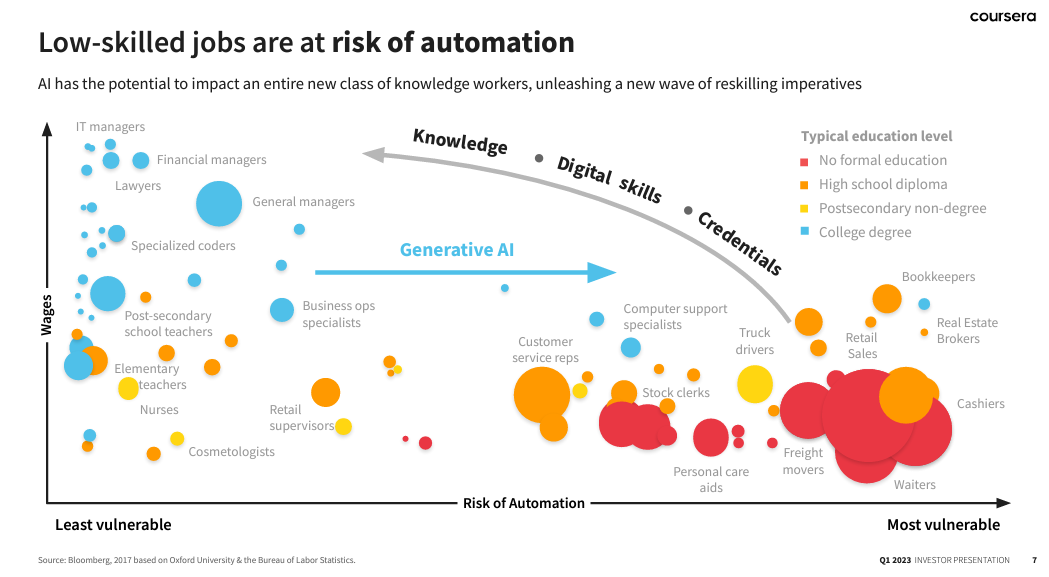Coursera: Generative AI will lead to reskilling, upskilling boom
Jeff Maggioncalda, CEO of Coursera, said generative AI such as OpenAI's ChatGPT-4 will have a much larger impact on education and employment than automation and other technology shifts.
Speaking on Coursera's first quarter earnings call last week, Maggioncalda said "we believe that AI represents the next major technological disruption that will dramatically change how we work and how we live."
Generative AI is a type of artificial intelligence that can produce content such as text, imagery, audio and data based on what it has learned from a massive training set of data. Generative AI has reached a tipping point as technologies such as OpenAI's ChatGPT and DALL-E have become popular. In addition, multiple technology vendors are racing to integrate generative AI into existing applications.

Generative AI guide: ChatGPT: Hype or the Future of Customer Experience
- What to Expect from Generative AI in Analytics and Business Intelligence
- Don’t Kill Innovation, But Apply Guardrails For AI
- How Generative AI Has Supercharged the Future of Work
Indeed, as generative AI revamps the workplace it's also going to create a lot of talent reskilling, said Maggioncalda. He said:
"We believe that generative AI will be integrated into applications, software, and platforms that employees are already familiar with. This integration is happening quickly, and we believe it will increase the importance of digital transformation and talent reskilling and businesses.
And this brings us to our second trend which is skills development. For years, employers have been rapidly digitizing work processes and jobs that are repeatable and predictable. And generative AI has the potential to impact an entirely new class of knowledge workers unleashing a new wave of reskilling and upskilling imperatives."
For Coursera, this disruption can increase its total addressable market. We'll all be students either learning new skills or upskilling to avoid being replaced by an algorithm. Education will have to transform to become more personalized and relevant--perhaps via generative AI. It's worth noting that Chegg recently announced CheggMate, a new AI personalized learning service built with OpenAI's ChatGPT-4.
While ChatGPT may be a long-term tailwind for online education companies and reskilling, there will be short-term turbulence.
For instance, Chegg reported solid first quarter results, but noted that ChatGPT is hampering new sign-ups. CEO Dan Rosensweig said:
"We believe that generative AI and large language models are going to affect society and business, both positively and negatively. At a faster pace than people are used to. Education is already being impacted. And over time, we believe that this will advantage Chegg.
In the first part of the year, we saw no noticeable impact from ChatGPT on our new account growth, and we were meeting expectations on new sign ups. However, since March, we saw a significant spike in student interest in ChatGPT. We now believe it's having an impact on our new customer growth. Fortunately, we continue to see very strong retention rates, suggesting that those students who already understand the value of Chegg continue to choose us and retain us at high rates. We are also expecting a positive recovery in enrollment trends, which historically would be good news for Chegg. Because it's too early to tell how this will play out. We believe that it's prudent to be more cautious with our forward outlook."
Constellation Research analyst Dion Hinchcliffe recently outlined in a research report how generative AI is already changing work. Governments and universities will have to adapt as well as enterprises.
Maggioncalda said:
"AI will amplify and accelerate the change being felt by individuals, pushing every one of us in every job to keep learning in order to stay relevant."
Coursera's bet is that its focus on universities as well as enterprises will transform learning. Coursera has launched Coursera Coach, a virtual learning partner powered by generative AI for personalized evaluations and feedback on submissions. Coursera is also using AI to generate course content, course structure, reading assignments and glossaries based on an author's input as well as recommend modules.
Internally, Maggioncalda said Coursera is leveraging generative AI to become more efficient in areas like research and development as marketing. He said:
"What I'm hearing from our engineers is that the productivity improvements that you can get as a software coder, especially at more entry-level software coding jobs is considerable. So, I think software coding productivity is going to go way up.
Most of our performance consumer marketing teams have been using (generative AI) to help write articles, write marketing messages, write emails, et cetera. Their productivity and quality has gone up quite a bit."
Generative AI will also be embedded into all the software tools being used by workers. "I would not be surprised that most CEOs are rethinking probably not work structure but certainly productivity expectations for how the company runs and what can be done by talented people in the company," he said.
DisrupTV Episode 200 - Featuring Leah Belsky from Constellation Research on Vimeo.

